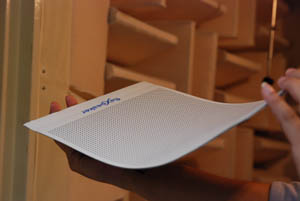Paper-thin “fleXpeaker” Features Revolutionary Speaker Design
ITRI in Taiwan beats major brands to
2010/03/18 | By Quincy LiangThe Industrial Technology Research Institute (ITRI), Taiwan's foremost technology research organization, beat over more than 500 competitors (including HP, Livescribe, and Motorola) to win first prize in the Consumer Electronics category of the Wall Street Journal Technology Innovation Awards with a highly innovative, paper-thin, flexible speaker dubbed the “fleXpeaker.”

The fleXpeaker is lightweight and consumes little power, and can be combined to produce high-fidelity speaker systems of almost any size. These features make it attractive for use in cellphones and car audio systems, with other potential applications including giant banners for delivering public-service announcements in train stations, or for advertising messages in shopping malls.
ITRI says it is seeking to license its new technology or use it to create a spin-off company that will commercialize the speaker.
The Wall Street Journal Technology Innovation Awards are among the world's most prestigious awards of their kind. The winners--unique technologies ready for commercialization--are chosen from around 1,000 entries every year, based on such criteria as breakthrough importance and revolutionary or evolutionary concepts.
The awards were first held in 2001. This year the judging committee consisted of 16 industrial and academic experts from prominent research institutions, venture capital firms, and major enterprises from various countries. The winners are often high-potential products; India's Tata Motors, for instance, won a prize not long ago for its revolutionary Nano mini car, which was recently introduced to the market and is proving highly popular.
ITRI president Dr. Johnsee Lee reports that the fleXpeaker development project was inaugurated by a research team at ITRI's Electronics and Optoelectronics Research Laboratories (EOL) in 2006, and that the related technology is now protected by 45 patents worldwide. Lee believes that the new speaker has an unlimited range of applications in home stereo systems, automotive stereo, earphones, industrial noise control, and many others. A paper on the new technology will be presented at the annual conference of the US Display Consortium and published in the Journal of the Acoustical Society of America later this year.
The fleXpeaker is made of paper and metal-cathode materials and can be mass-produced using printing methods. Lee is sure that the new technology will bring the acoustic speaker industry into a brand-new era, promote the transformation of the conventional speaker industry, and help create revolutionary consumer products such as memory cards with voice capability and ultra-thin MP3 players. It could even be incorporated into other products that are integrated into green buildings, electric vehicles, and entertainment and medical devices. It will help to create new lifestyles and cater to the pursuit of personalized, humanized applications.
In contrast to clunky, heavy conventional speakers, the fleXpeaker is less than 0.1 centimeter thick, light in weight, and flexible. Its sound is also good, covering a range of 20 to 200 kHz. It is especially good with high-frequency sounds such as the chirps of birds and insects, where fidelity equals or exceeds that of conventional speakers. In addition, the fleXpeaker uses only 10% as much power of conventional speakers, making it environmentally friendly.
ITRI reports that the fleXpeaker technology is expected to be transferred and put into trial production in late 2009 or early 2010.
The possibilities are endless. The new speaker can be integrated into clothing, memory cards, buildings—and even into radio receivers in instant-beverage packages that sold all over the world, bringing radio reception to even the remotest areas.




